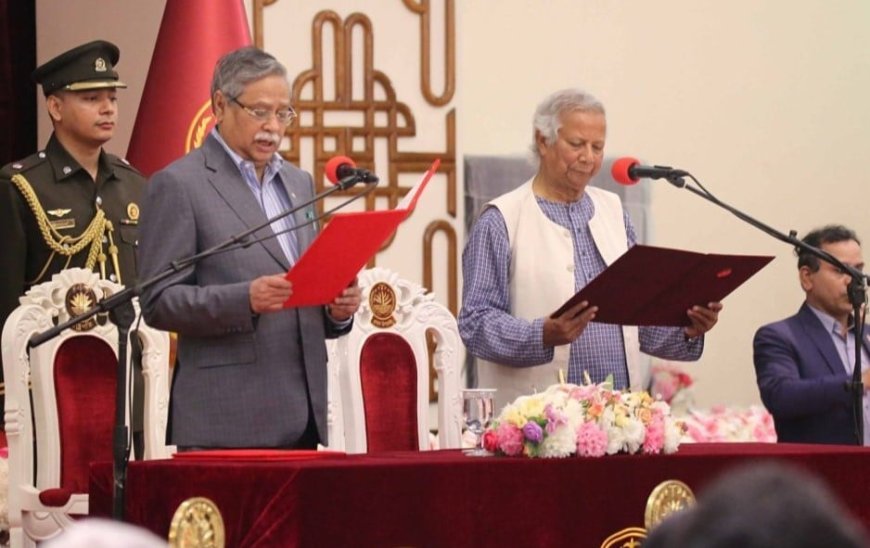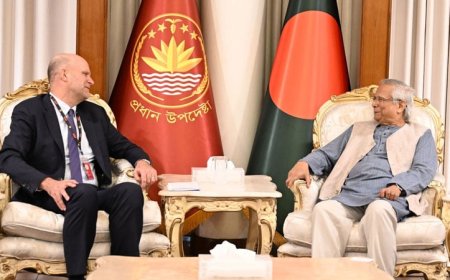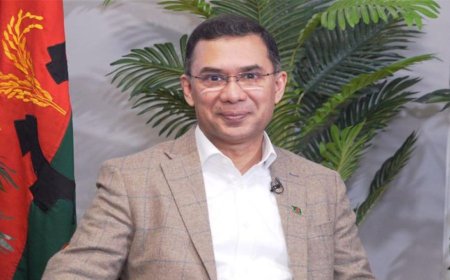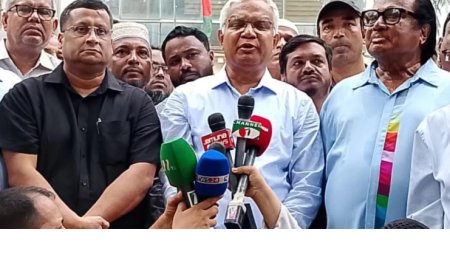Interim government completes first year in office with significant accomplishments
Interim government completes first year in office with significant accomplishments

Interim Government Led by Prof Yunus Marks One Year in Office with Major Reforms, Stability, and a Roadmap for Democracy
The interim government headed by Nobel Laureate Professor Muhammad Yunus completes its first year in office today, having taken charge on August 8, 2024, following a dramatic political shift triggered by the mass uprising that toppled the regime of Sheikh Hasina on August 5.
The nationwide movement—spearheaded by students and backed by broad segments of the public—came at a steep human cost, with many killed or injured in clashes during the protests. Amid this turmoil, the Yunus-led administration assumed power and has since received broad credit for steering the country through a fragile transition, enacting landmark reforms in governance, electoral integrity, media freedom, law and order, and the judiciary. Notably, it also initiated the prosecution of those responsible for the killings during the uprising.
July Declaration and Democratic Transition
To commemorate the first anniversary of the uprising on August 5, the government unveiled the July Declaration, a key step in its commitment to institutional reform. Preparations for the July Charter, which incorporates inputs from over 30 political parties through the National Consensus Commission, are nearing completion.
In a televised address on July Uprising Day, Chief Adviser Prof Yunus announced that the next parliamentary elections will be held in February 2026, ahead of Ramadan. The following day, the Chief Adviser’s Office formally instructed the Election Commission (EC) to begin preparations for the polls. The EC later confirmed it will announce the election schedule in early December.
Governance Reform and Commissions
To institutionalise change, the interim government has formed a series of reform commissions covering electoral policy, police, judiciary, public administration, anti-corruption, health, media, labour rights, and women's affairs. Most commissions have submitted their recommendations, many of which are already being implemented.
Economic Stabilisation and Inflation Control
Despite facing immediate crises, including widespread flooding that damaged crops in the north and south, the interim government has stabilised the economy. It brought down overall inflation to 8.48% in June, the lowest in nearly three years, and expects food inflation to fall to 6% by December. Measures included tighter market monitoring, curbing middlemen influence, and ensuring stable supply during Ramadan.
Thanks to improved governance and rising public confidence, remittance inflows hit a record US$ 30.33 billion last fiscal year. Export earnings also grew by 9%, and the local currency, the Taka, has begun to appreciate against the dollar for the first time in years. The government also cleared US$ 4 billion in foreign debt repayments over 11 months, while foreign exchange reserves continued to rise.
Key Achievements of the Interim Government (Year One)
1. Restoration of Peace and Stability
Following the uprising, the administration restored order, avoided retaliatory violence, and offered moral leadership, steering the country toward democratic healing and inclusive politics.
2. Economic Recovery
-
Reduced food inflation from 14% to near half
-
Overall inflation fell to 8.48% (lowest in 35 months)
-
Record remittances of US$ 30.33 billion
-
Export growth of 9%
-
Strengthening of the Taka and banking sector stabilisation
3. Trade and Investment Upsurge
Bangladesh concluded key tariff deals with the US and secured major foreign investments, including the Handa Group’s US$ 250 million project in textiles, generating 25,000 jobs. FDI has doubled compared to the last regime, with growing interest from Chinese and other global investors.
4. Democratic Reforms and July Charter
A broad-based consensus has been forged through multi-party dialogue, leading to the finalisation of the July Charter—a comprehensive blueprint for democracy, checks and balances, and safeguards against authoritarianism.
5. Justice for July Massacre Victims
Trials of those involved in the July–August 2024 violence are ongoing. Four major trials have begun, including that of former Prime Minister Sheikh Hasina, with an emphasis on transparency and due process.
6. Election Roadmap
Elections are set for February 2026, with inclusive participation of expatriates, youth, and women. Plans include digital platforms for citizen consultation and deploying 800,000 personnel—including police, Ansar, and military—for peaceful polling.
7. Institutional and Legal Reform
-
Judiciary: Transparent, reform-based appointments
-
Police: Human rights cells, bodycams, UN-standard protest protocols
-
Legal reforms: Revised CPC/CrPC, new arrest safeguards (12-hour family notification, lawyer access, online GD system)
8. Media and Internet Freedom
The Cyber Security Act has been repealed, all cases against journalists dropped, and internet access declared a fundamental right—a first in Bangladesh’s history.
9. Balanced Foreign Policy
Shifting from dependence on a single partner, the interim government has rebalanced foreign policy, deepening ties with the US, China, EU, and others. It has pursued SAARC revival, sought ASEAN membership, and enhanced regional cooperation in trade, health, and crisis management.
10. Expatriate and Labour Policy
Progress includes resumed UAE visas, Malaysia’s MEV policy, and legalisation of undocumented Gulf workers. Plans are in place to send 100,000 youth to Japan and expand labour migration to Italy, Korea, and Serbia.
11. Support for Martyrs and Revolutionaries
The government has identified 775 martyrs' families, distributing nearly Taka 1 billion in savings certificates and allowances, alongside Taka 1.53 billion in aid for 13,800 injured revolutionaries. Some victims have been sent abroad for treatment and rehabilitation.
12. Maritime and Infrastructure Vision
Declaring the Bay of Bengal a strategic resource, the government has scaled up port efficiency, launched coastal infrastructure projects, and initiated deep-sea fisheries development with international partnerships.
13. July Uprising Memorial Initiatives
The Ganabhaban is being transformed into the July Mass Uprising Memorial Museum, preserving artefacts, letters, news clippings, and personal effects from the protests. The July Shaheed Smrity Foundation was also launched to aid injured activists and victim families.
The first year of the interim government has seen a remarkable blend of stabilisation, reform, and forward momentum. With national elections now on the horizon, and the July Charter nearing finalisation, Bangladesh stands at a pivotal moment—transitioning from crisis to consolidation, with renewed hope for democratic permanence.
What's Your Reaction?





















































































